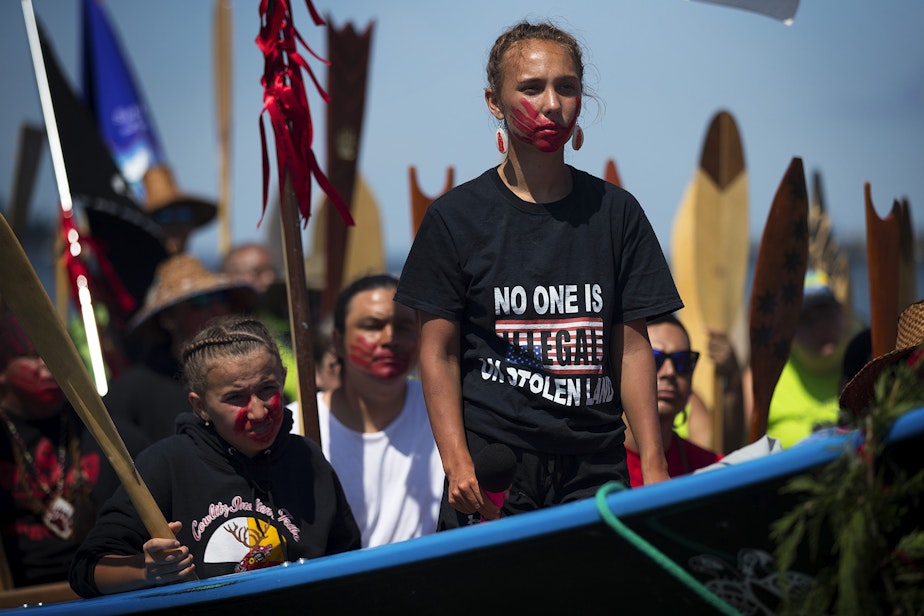Missing and murdered indigenous women get spotlight: Washington task force to examine data

Washington is one of several states with a task force to address Missing and Murdered Indigenous Women and People. The group held its first meeting this week.
Attorney General Bob Ferguson convened the 23-member task force, which includes elected officials in state and tribal governments and other stakeholders. They’ll report back to the governor and legislature about barriers in data collection, and other hurdles that have allowed violence against Indigenous people to go underreported and unresolved.
The Yakama Nation co-hosted the first meeting of the task force Thursday in Toppenish, Washington. It began with a prayer circle organized by Roxanne White and her organization Missing and Murdered Indigenous People & Families.
The taskforce then convened an emotional public hearing where people described often-desperate searches for missing family members.
Veronica Jimicum told the task force it’s been one year since her cousin Mary Johnson-Davis disappeared, after being last seen on November 24, 2020, heading to a friend’s house in Tulalip, Washington. Johnson’s husband reported her missing on December 9, 2020. Jimicum said Johnson-Davis’ family is heartbroken at the lack of progress on her case.
They are planning an event on December 9 at the Tulalip Gathering Hall in Marysville to highlight their search efforts. The Tulalip tribes and the FBI are offering a total of $60,000 for information about her case.
Sponsored
Johnson-Davis is one of more than one hundred Indigenous people listed as missing by the Washington State Patrol.
Athlete and advocate Rosalie Fish spoke at Thursday’s hearing about cases of missing and murdered women on the Muckleshoot reservation, and said too often families struggle to find loved ones without assistance from law enforcement.
“These cases and murders are completely preventable. Indigenous victims and families are doing this on their own, putting aside their own healing, because if we don’t bring up these names, no one will,” Fish said.
She also noted the case of Muckleshoot tribal member Renee Davis who was killed by King County deputies during a welfare check after she was reported to be suicidal.
Annie Forsman-Adams is the policy analyst for the task force with the Attorney General’s office. She said the first priority for the task force “was to have a conversation with community members about what is happening, what they would like to see out of the task force, and what their experience is with the system and as families and survivors of violence and those who have missing and murdered Indigenous relatives.”
Sponsored
She said Washington state already has grassroots groups that have provided a foundation for this work “so we can hit the ground running.”
Forsman-Adams also said the Washington State Patrol has done a good job of updating the list of missing Indigenous people to accurately reflect the most recent cases.
“I think they’re still working at identifying where some of the gaps in data are, but it is a very comprehensive and up-to-date list,” she said.
According to the Attorney General’s office, “The task force will assess the systemic causes that contribute to disproportionate rates of violence, provide recommendations for addressing barriers and review data collection and reporting protocols. Recognizing that tribal boundaries and communities would have extended far beyond contemporary borders, the task force will also address how the surrounding states and Canada are impacted by the jurisdictional and data gaps.”
The group will deliver progress reports and a final report in June 2023.




